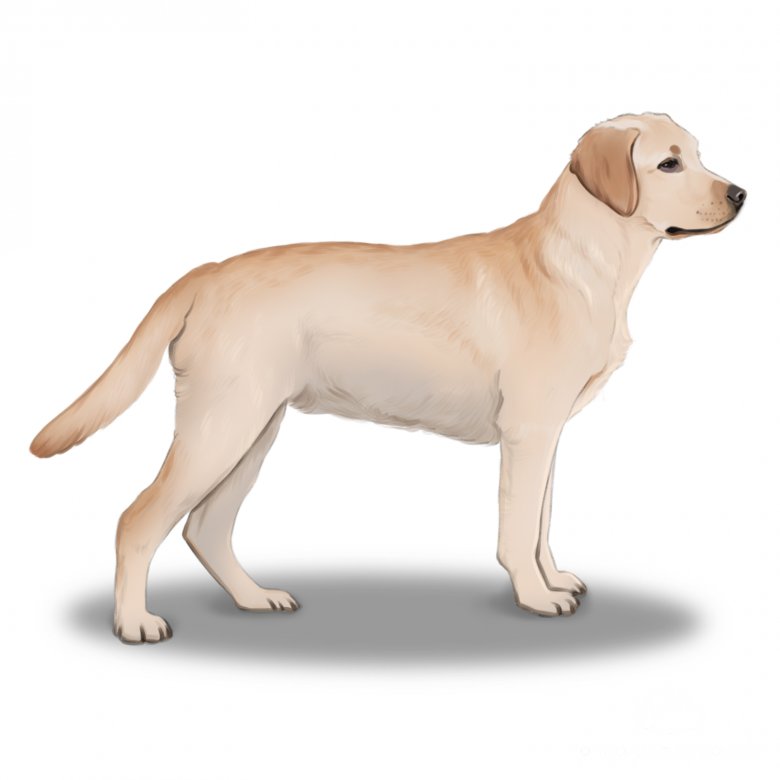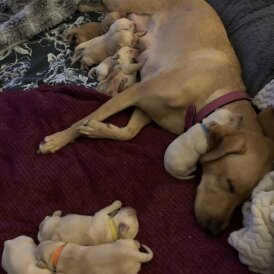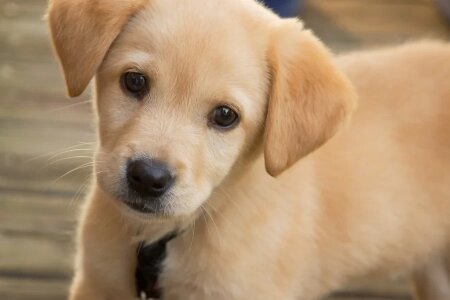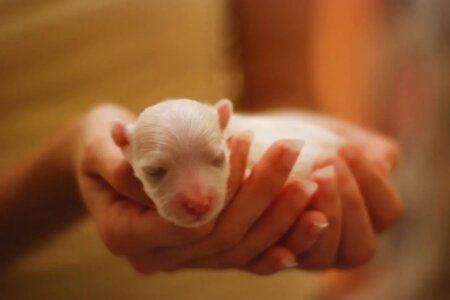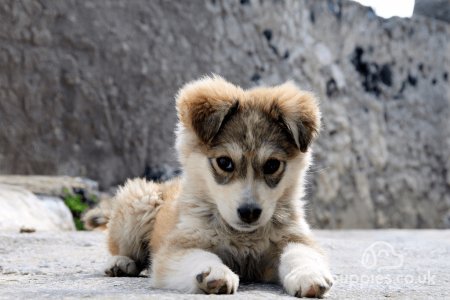Goldador (Golden Labs)
Overview
The Goldador represents a successful mixture of the affectionate but hard-working nature of the Golden Retriever and Labrador Retriever, making the breed great working dogs but also brilliant family pets. Goldadors high intelligence means that they can be found working in a variety of roles such as guide dogs or search and rescue dogs. However, they are also happy and loving family pets who are great for first-time owners and young families due to their fantastic trainability and sociable nature.
Physical Appearance
Height: 59-61 cm (Males and Females)
Weight: 27-36 kg (Males and Females)
Goldadors have a powerful but kind outward appearance. Their heads are strong and large but not out of proportion to the rest of their body. Their ears are large and sit on the sides of the breed's face. Their coat can either be quite short and straight or a little longer with a slightly more wavy appearance. This coat can come in the colours of; Cream, Liver, Chocolate, Black, or Gold. Goldadors tail shape can vary depending on which of the two parent breeds it adheres to most, Labradors have straighter tails whereas the Golden Retrievers tend to have longer and more slim tails.
Character Traits
Are Goldador dogs intelligent? Yes
Are Goldador dogs affectionate? Yes
Do Goldador dogs have high or low energy levels? High
Are Goldador dogs loyal? Yes
Are Goldador dogs playful? Yes
Are Goldador dogs aggressive? No
Are Goldador dogs easy to train? Yes
Are Goldador dogs good guard dogs? No
Loyal, affectionate, and kind, a Goldador would provide a family with a lot of love and happiness. They are energetic dogs, needing at least an hour of exercise a day and they love to please their owners meaning the breed will happily accompany them on any outdoor activities, especially if their owner enjoys jogging. Their eagerness to please makes them very trainable, they love playing games and learning new skills, hence the variety of jobs which working Goldadors are able to carry out. Whilst they are happy to be very active, once they have been exercised sufficiently they are happiest relaxing in the company of their family. This loyalty and attachment to their family mean they are best in households where at least one person is around all of the time.
Ability to Socialise
Goldadors can get along very well with other dogs when socialised from an early age. They can also get along with family cats if they have grown up alongside them, however they can also chase cats they don’t know, and whilst incidents are rare they should be watched when around small pets in general. One reason why Goldadors are great family pets is that they absolutely love being around kids and playing with them. Of course, playtime should still be supervised with children to prevent any accidents resulting from an excitable puppy. Goldadors are also generally very friendly to strangers and will happily greet any guests coming into the house.
Lifestyle Suitability
Are Goldador dogs good for first-time owners? Yes
Are Goldador dogs hypoallergenic? No
Are Goldador dogs prone to drooling? No
Are Goldador dogs a good breed for apartment living? They can adapt to apartments if they get enough outdoor exercise.
Do Goldador dogs shed a lot? Yes
Do Goldador dogs bark a lot? No
Can Goldador dogs be left alone at home? Only for short periods of time.
Can Goldador dogs handle the heat? Moderately.
Can Goldador dogs handle cold temperatures? Yes
Are Goldador dogs sensitive to loud noises? Not if introduced to them early on.
Goldadors are a great fit for first-time owners as their easy-to-please nature means they are happy to fit into the family once exercised sufficiently and are very receptive to training. As long as they get at least an hour of exercise a day, Goldadors can adapt to living in an apartment, although they are more suited to houses that have an outdoor area they can roam around or play in as they please. The breed is very attached to its family and therefore is much better suited to households where there will be at least one family member home at all times. Climate wise the breed is better suited to slightly cooler temperatures where their double coat will keep them warm, and they should be kept in the shade in really hot temperatures. Their coat sheds quite a lot throughout the year and therefore needs regular grooming.
General Health and Health Issues
How long do Goldador dogs live? - 10-15 years
Goldadors are able to inherit any of the following hereditary diseases from their parent breeds:
Elbow and hip dysplasia: When the hip or elbow joint does not grow properly, which can wear as the dog gets older and cause pain or lameness.
Eye problems: Goldadors can inherit many eye issues, such as Cataracts, Multifocal Retinal Dysplasia, Total Retinal Dysplasia, Progressive Retinal Atrophy.
Again, prospective owners should check that the breeder has tested its stud dogs for these eye issues, such as through the BVA/KC eye scheme. They can also get their puppies tested when they reach 12 months.
Diabetes: This can be spotted if your dog is drinking and/or urinating more than usual or is eating more but losing weight at the same time.
Exercise and Play Time
How much exercise does a Goldador dog need? Minimum 1 hour per day.
Do Goldador dogs like water play? Yes mostly.
Goldadors are high-energy dogs and need at least an hour of exercise per day with mental stimulation on top of this. This exercise can include a variety of different things as Goldadors are happy to get stuck in with many activities and are comfortable in a range of scenarios, whether it be jogging with their owner through a park or a walk in the countryside where they can let off steam safely off the lead. As long as your Goldador has been trained to have good recall then the breed is not a danger to other dogs to have off the lead as they do not have a high prey drive. Off the lead time is best so they can really exert their energy, however a mixture of walks, playtime, and more intense exercise throughout the day is also an ideal combination for Goldadors.
Nutrition and Feeding
Are Goldador dogs prone to weight gain? Yes
How much should I feed a Goldador puppy? 3-4 portions a day
How much should I feed an adult Goldador dog? 2 portions a day
Goldadors absolutely love food, which is a bonus when it comes to training them, however it can mean they are slightly more prone to obesity and therefore their weight should be watched and their exercise or portions adjusted accordingly if they start putting on weight.
It is always best to ask the breeders what food your puppy has been brought up on and stick to this to avoid upsetting their stomach by changing their diet too quickly. However if you do wish to change their food, Goldadors should be fed kibble for larger dogs, as this will hold the correct amount of nutrients and vitamins for your dog. Every dog is different and the amount of food they should be fed will depend on their weight and the amount of exercise they do.
Care and Maintenance
Grooming: As Goldadors do shed quite heavily throughout the year they do require their owners to keep on top of their brushing. If your Goldadors coat is relatively short, it should be brushed up to two times a week. If your Goldador has a longer and more wavy coat it should be brushed up to four times a week. Their ears should also be checked regularly for a build-up of wax which could lead to infection.
Emotional care: Goldadors love being around their family and therefore are not the type of pet you should have if you leave the house empty for long periods of time. They also require a lot of exercise, therefore its owners should be committed to providing at least an hour of intense exercise for them every day, coupled with some playtime and perhaps mental stimulation via training on top of this.
Training: The Goldadors family orientated nature leaves them yearning to impress their owners and this combined with their intelligence makes them very trainable dogs.
History of the Goldador
The Goldador is a relatively new breed made with the intention to mix two of the most popular purebreds, the Labrador Retriever and the Golden Retriever. The aim was to create a dog with the fun-loving and affectionate family-orientated characteristics of the Golden Retriever with the working side of the Labrador. Such an aim was successful with Goldadors now placed in a variety of working dog positions such as search and rescue, bomb detection, guiding the blind, and more. As they are considered a ‘designer dog’ they aren’t recognised by any international kennel club organisations and whilst they are quite popular in the UK, they haven’t yet achieved the same popularity as other ‘designer dogs’ such as the labradoodle.
Interesting Facts About Goldador Dogs
They are a more predictable crossbreed than most as the Golden Retriever and Labrador have very similar features.
Goldadors are a very versatile breed as they can work as guide dogs and therapy dogs but also can be trained in bomb detection and search and rescue.
The Guide Dogs for the Blind Association said that Goldadors are the most successful guide dog breed.
The exact history of the breeding of Goldador puppies is unclear as they have been bred informally for many years for field sports, but more recently within the last 20 years they have started to be bred more formally as service dogs.
Getting a Goldador Puppy
How much does a Goldador cost to buy? - £800-£2100
How much does a Goldador cost to feed? - £40-£50 a month
How much does insurance for a Goldador cost? - Basic Pet Insurance is around £25 a month, whereas a lifetime cover is around £45.
Goldadors are quite a popular crossbreed in the UK and therefore breeders can ask for quite a high price. Prospective owners should get information on the condition of the puppy's parents before buying, to ensure that they have the correct physical attributes, health, and temperament. Please see our buying guide which provides more insight on what to research and ask of your breeders. It is also important to be careful of scammers and to visit the puppy before buying.
Click here to see any active Goldador puppy listings for sale on our website currently.
Adoption & Rescue
When considering buying a puppy, it is always worth considering whether adopting and re-homing a rescue dog might be more suitable.
The RSPCA, Battersea Dog Home, and the Dogs Trust all have some great advice and listings on dogs that need re-homing.






